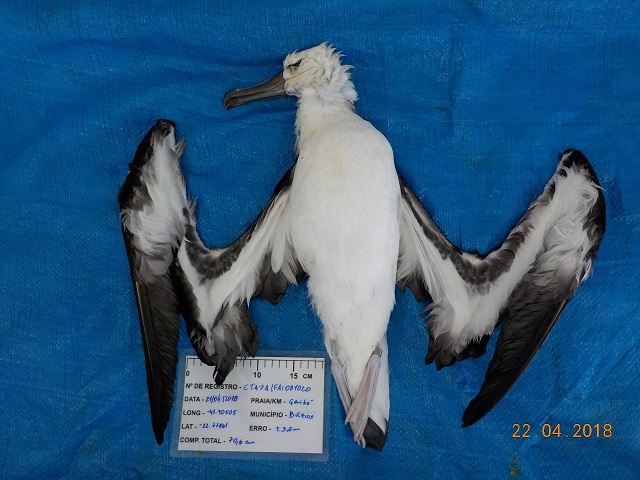Davi Tavares (Department of Theoretical Ecology and Modelling, Leibniz Centre for Tropical Marine Research, Bremen, Germany) and colleagues have published open access in the journal Animal Conservation on at-sea mortality of three seabird species based on stranding data, including of the ACAP-listed and globally Endangered Atlantic Yellow‐nosed albatross Thalassarche chlororhynchos.
The paper’s abstract follows:
“Large‐scale climatic processes such as the El Niño‐Southern Oscillation (ENSO) can have severe effects on the survival of seabirds in their breeding regions. However, there is a fundamental lack of understanding about how environmental factors are related to the mortality of these organisms in non‐breeding areas of the tropics. We investigate here the direct and indirect effects of ENSO and oceanographic variables on the mortality of three migratory seabird species targeted by conservation programmes focused on human impacts: the Atlantic yellow‐nosed albatross Thalassarche chlororhynchos, the Magellanic penguin Spheniscus magellanicus and the Manx shearwater Puffinus puffinus in a non‐breeding area in Brazil, tropical Atlantic. We find that the intensification of ENSO increases the mortality of Manx shearwaters by enhancing the local storm activity. The mortality of Atlantic yellow‐nosed albatrosses and Magellanic penguins is also related to a local increase in storm activity but regardless of the ENSO signature. Increased mortality of Magellanic penguins is observed when biological productivity falls below the annual average (1.7 mg m−3). Adverse climatic conditions are highly deleterious for migratory seabirds and single storm episodes can cause massive deaths, thus exacerbating population declines. We argue that conservation and management strategies for migratory seabirds studied here should not only focus on direct human impacts but should also consider mitigating the effects of climate variability.”

Juvenile Atlantic Yellow-nosed Albatross washed ashore in Brazil (click here)
Reference:
Tavares, D.C., Moura, J.F., Merico, A. & Siciliano, S, 2019. Mortality of seabirds migrating across the tropical Atlantic in relation to oceanographic processes. Animal Conservation doi:10.1111/acv.12539.
John Cooper, ACAP Information Officer, 16 October 2019

 English
English  Français
Français  Español
Español